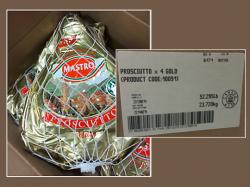Santa Maria Foods Recalls Prosciutto, Possible Listeria Contamination
December 16, 2013 | 2 min to read

Santa Maria Foods, a Brampton, Ontario, establishment, is recalling approximately 2,600 pounds of whole boneless ham prosciutto product due to possible contamination with Listeria monocytogenes, the U.S. Department of Agriculture’s Food Safety and Inspection Service (FSIS) announced.
The ham product was shipped to California and Michigan for further distribution. Case labels bear the Canadian establishment number “473A” within the Canadian mark of inspection. The following product is subject to recall:
- Approximately 50-lb. boxes labeled “PROSCIUTTO x 4 GOLD” with the case codes BR031356 or BR031374, produced on Nov. 14 and Nov. 15, 2013. Each box contains 4 individually packaged hams with the case codes BR031341 or BR031354.
The problem was discovered by FSIS sampling collected during routine reinspection. The sampled product was held, but further investigation by Santa Maria Foods revealed that additional potentially implicated product had been released into commerce. FSIS and the company have received no reports of illnesses associated with consumption of these products. Anyone concerned about an illness should contact a healthcare provider.
Consumption of food contaminated with L. monocytogenes can cause listeriosis, a serious infection that primarily affects older adults, persons with weakened immune systems, and pregnant women and their newborns. Less commonly, persons outside these risk groups are affected.
Listeriosis can cause fever, muscle aches, headache, stiff neck, confusion, loss of balance and convulsions sometimes preceded by diarrhea or other gastrointestinal symptoms. An invasive infection spreads beyond the gastrointestinal tract. In pregnant women, the infection can cause miscarriages, stillbirths, premature delivery or life-threatening infection of the newborn. In addition, serious and sometimes fatal infections in older adults and persons with weakened immune systems. Listeriosis is treated with antibiotics. Persons in the higher-risk categories who experience flu-like symptoms within two months after eating contaminated food should seek medical care and tell the health care provider about eating the contaminated food.
FSIS routinely conducts recall effectiveness checks to verify recalling firms notify their customers of the recall and that steps are taken to make certain that the product is no longer available to consumers. When available, the retail distribution list(s) will be posted on the FSIS website at www.fsis.usda.gov/recalls.
Source: USDA FSIS
